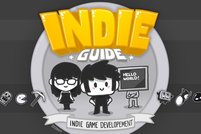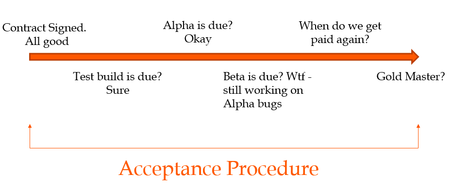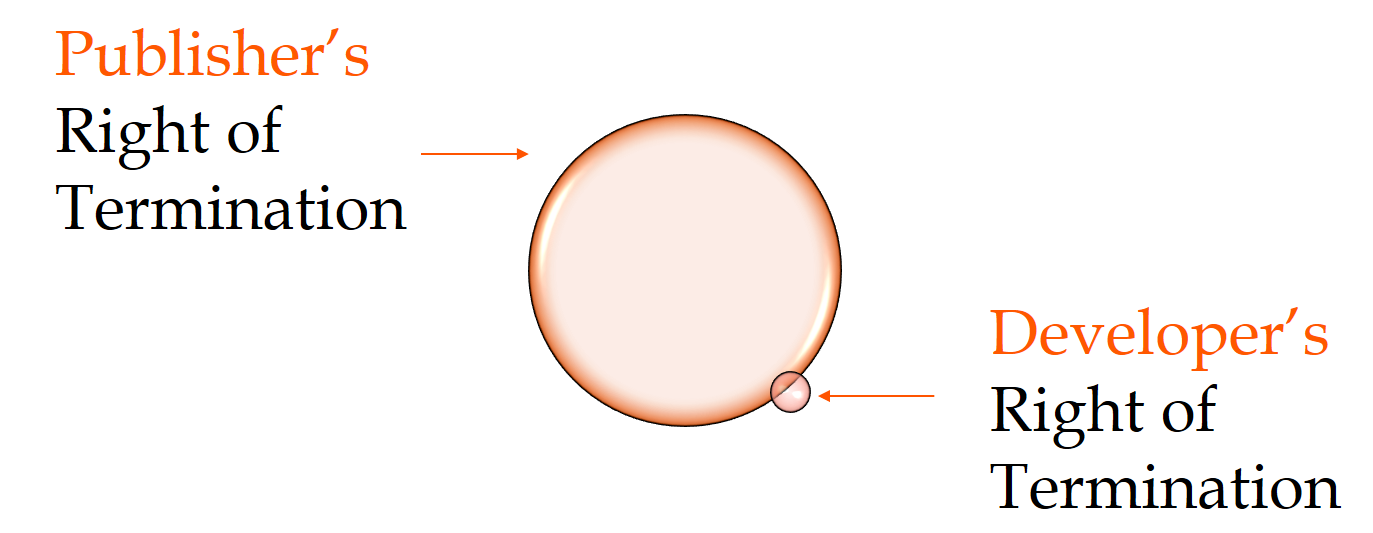 A practical guide for indie devs on evaluating and negotiating a publishing deal. A publishing deal is potentially one of the most important contracts you’ll ever enter into regarding your game. A good one can see long-term partnerships thrive and successful games brought to life, whereas a bad one can lead to bitter disputes about royalties, deadlines and even game / IP ownership. I seriously believe that the vast majority of publishers out there aren’t intentionally looking to tie people into crappy contracts. What I do think though is that the paperwork formalizing these deals isn’t always given the attention it deserves (by either devs or publishers) at the time when it’s needed the most - i.e. before signing. It’s a dev’s own responsibility to negotiate a good publishing agreement – don’t always just assume that the contract you’ve been given is fair or even 100% reflects what has been discussed verbally. Publishing deals are more often than not fairly complex and unless you’ve been through the process several times before, there’s little substitute for getting a professional advisor involved (i.e. a lawyer, consultant, business advisor, veteran indie dev etc). However, for those still looking to go it alone, I wanted to put together this guide to help identify some of the things which you should normally think about when negotiating a publishing deal, and the resulting answers put into the contract. PRE-CONTRACT STUFF Why do you want a publisher? Before thinking about partnering with a publisher, it’s important to be clear on what you actually want out of the relationship. To answer that, it’s important to know what publishers typically do. This varies from publisher to publisher (more on this later), but can include:
Do you need a publisher? Once you’ve decided what you want, the next step is to ask yourself if you actually need a publisher to achieve these things – i.e. is there some alternative means out there which doesn’t involve giving away royalties/rights in your game. For example, are there any alternative funding options available (e.g. crowdfunding, the UK Games Fund, the Wellcome Trust, loans from friends/other devs)? Do you actually need a distribution partner if you’re only creating a digital-only Steam/console game? Which countries are you actually releasing in – do you need expertise in territories like Asia (which are notoriously difficult / impossible to pursue alone)? Do you need a publisher’s skill set for marketing and PR or are there any social media / PR agencies that could work equally as well? Could you even do some of these things yourself? That last point is an important one. While it’s certainly possible to do some of these things yourself, remember that this is going to take time. A lot of time. Time which is keeping you from actually working on your game. And remember, a good publisher will have done this all multiple times before which should minimize mistakes and hopefully keep things as efficient as possible. Releasing a game solo is incredibly hard work – always think carefully about whether or not you can realistically achieve everything (including the business / admin stuff) that needs to be done. If so, which publisher? If you’ve decided to look for a publisher, the next step is finding the right publisher for you and your game. Publishers come in all shapes, sizes and personalities and finding the right one can take a fair amount of work. First off, you’ll want to make sure that the publishers (yes, plural – keep your options open) you’re actually targeting are known for offering the things you’ve decided you need – e.g. does that publisher actually offer completion funding? Do they actually have partners and connections in the foreign territories you want to reach? Do they have experience in the formats (physical/digital) on the platforms (consoles, PC etc) that you want to launch on? What have their previous marketing efforts looked like – were you impressed? Does their existing catalogue of titles and general reputation match up with the type of game you’re making? You can find a huge amount of information about publishers online, whether through the publishers’ own websites, dev blogs, post-mortems on Gamasutra, generally Googling etc. Also, don’t be afraid to reach out to previous devs who have worked with that publisher in the past – particularly those whose games may not have been the biggest sellers or that had troubled development cycles (those devs will give you a better insight into what the publisher is like when things aren’t necessarily going perfectly). CONTRACT FUN Once you’ve piqued the interest of a couple of publishers, it’s time to start getting into the details of the deal on the table. When it comes to publishing agreements, four of the most important areas to think about are: (1) Intellectual Property Rights; (2) Financials; (3) Milestones; and (4) Termination Rights and Consequences. (1) INTELLECTUAL PROPERTY RIGHTS “If a game is your baby, the intellectual property is its soul” – this great Gama piece I love this quote because it perfectly encapsulates the importance of intellectual property rights (IPR) in a game. Whoever owns the IPRs basically has control over what is (and what isn’t) done with that game (but keep reading for exceptions to this!). As a result, IPR ownership should be one of the things at the front of your mind when negotiating a publishing deal. My default position when advising clients is that devs should retain full IPR ownership in the game that is created. However, there are no hard and fast rules here. If you’re faced with retaining IPR ownership but not being able to secure funding on the one hand, but giving up IPR ownership and securing a substantial development budget, a fair rev share across all income streams from a proven publisher, it’s at least worth being open to the deal on the table. A lot comes down to your own personal circumstances (e.g. do you need this deal to keep the studio afloat), how important this game is to you (maybe it’s not one you see becoming your primary franchise) and importantly, what other rights you get/give away in the rest of the publishing agreement. Even if you retain IPR ownership, what should you look out for? Even if you retain IPR ownership in the game, there are still a number of ways you could accidentally give away more than you intend to, which can drastically limit your control over your own game! And that’s because even though you own your game, you’ll need to grant the publisher a ‘licence’ over this in order to legally permit the publisher to do all the good things they’re meant to do. Problems can arise though when the conditions of that licence are ambiguous or overly wide – the precise wording of a licence is very important and single words can make all the difference (no exaggeration!). When it comes to looking at licences, some of the things you should look out for include:
The moral of this section is to make sure you’re 100% clear with what rights you’re giving away. If you’re unclear what something means, think something is drafted too widely or is simply wrong, always question this and get the contract tidied up. If you give up IPR ownership, is there anything you can do to improve your position? If you decide to part ways with the IPR ownership, there are still a number of things you can look to negotiate which could give you some level of involvement in future projects in the franchise. For example:
Summary: IPR ownership is an incredibly important topic and my default position is that the devs should retain this. However, hopefully the above demonstrates that while IPR ownership is important, there are a number of ways in which you can (i) unintentionally lose control of your IP even if you own it, and (ii) gain some future involvement with the IP, even if you give up actual ownership. In other words, it’s important not to tunnel-vision on the idea of IP ownership alone, since everything else in the contract can have a major impact on how that IP ownership actually works in practice – always read the contract as a whole. (2) FINANCIALS The financial terms are the next that should be given your close attention. Things you’ll want to think about here include:
(3) MILESTONES The Milestones set out the development and funding timeline for a game and are normally found tucked away in the back of a publishing agreement in its ‘schedules’. Checking details here is crucial to make sure this section clearly sets out:
(4) TERMINATION RIGHTS AND CONSEQUENCES Although it sounds negative to be thinking about termination rights/consequences at the start of a hopefully very positive working relationship, don’t let that stop you from being forward thinking. After all, one of the main purposes of contracts is to set out what happens when things go wrong. In the majority of publishing agreements, termination rights will be weighted in favour of the publisher, particularly where it is providing development funding (which makes sense since the publisher assumes a lot of the up-front risk in investing in you/the game). That said, there are some termination rights which a developer should always look for, such as for serious breaches by publisher (e.g. payment defaults, misuse of your IP etc) and if the publisher goes into liquidation. Make sure to read the publisher’s termination rights carefully as well as your own – does the publisher have additional termination rights prior to the commercial release of the game? Does the publisher have any ‘termination for convenience’ rights (i.e. it can terminate at any time for any - or no - reason)? Can the publisher terminate if you fail to submit a milestone on time or if it rejects a deliverable multiple times? But it’s not just when either party can terminate that’s important – a good publishing agreement should set out clearly what happens in the event of termination. Things to think about there include:
There are no hard and fast rules here and a lot of these points will be open to negotiation – don’t be shy to negotiate and remember that now is the time to be thinking about these things, not later. And in my experience that’s one of the main reasons for getting a professional advisor involved in negotiating a publishing deal – they’re there to point out the tricky questions which can easily slip your mind while everything else is going on and to fight your corner as hard as possible. THAT’S IT? Not yet! Most contracts are softly divided into two halves – one that deals with the ‘commercial’ terms (like those above) and one that deals with all of the legal stuff like confidentiality, 'indemnities', 'liabilities', 'warranties and representations', governing law and jurisdiction etc, which will most likely be written in fairly hefty legalese. Unfortunately there’s no simple way around having these reviewed by someone who’s familiar with the terminology. But both parts are equally important and the legals should be given as much attention as the commercial parts of a deal. After all, in the event that something goes seriously wrong, it’s often the legals that will dictate how risk/liability is divided between the parties. TL;DR
TIPS
Boring Disclaimer: Please remember, I’m not your lawyer (unless I actually am, in which case hi!). Either way, this is not legal advice – legal issues are very fact specific. If you’d like to learn more you can reach me at @LegalGamerUK. Thanks for reading! =)
12 Comments
CeilingPanda
1/23/2017 04:52:50 pm
Nice written, seems like a easy person to talk to and wouldn't mind having you as my lawyer, though I don't need one right now nor do I have the money, thanks for the writeup though.
Reply
Greg Quinn
1/25/2017 08:39:34 am
Great article, perhaps the best I've read on getting a publishing deal.
Reply
6/27/2017 05:05:54 pm
Great article, I have similar view on this topic.
Reply
8/22/2017 12:54:11 pm
Casinos online are in many ways considered to be the most advantageous medium to gamble for some real money. It is one medium which offers you the enjoyment of a variety of traditional and modern casino games right from your home computer. Other than gaming excitement, online casinos also bring you the complete knowledge of different games.
Reply
2/16/2022 12:29:52 pm
Excellent article! Your post is essential today. Thanks for sharing, by the way.
Reply
12/21/2022 01:48:21 am
İnstagram takipçi satın almak istiyorsan tıkla.
Reply
1/8/2023 06:26:33 am
100 tl deneme bonusu veren siteleri öğrenmek istiyorsan tıkla.
Reply
6/30/2023 03:06:53 am
En iyi aksaray ilan sitesi burada. https://aksaray.escorthun.com/
Reply
Leave a Reply. |
Categories
All
Archives
April 2019
Header Photo: (c) owned by Square Enix - thanks for making Vivi so awesome!
|


